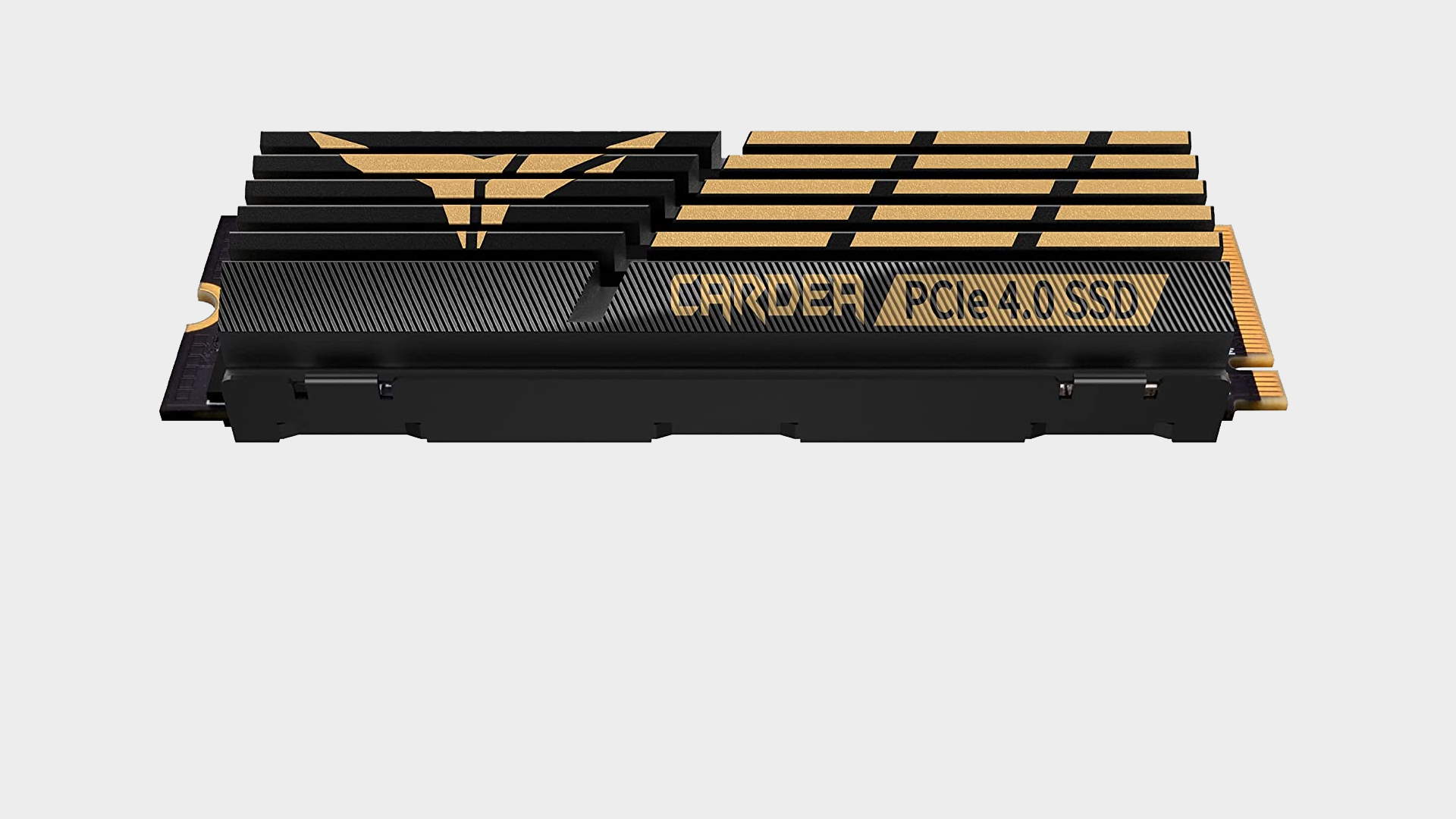Our Verdict
You're not going to miss a pretty much irrelevant amount of read performance, and the Teamgroup Cardea A440 offers many storage strengths of its own. It's an easy recommendation... assuming the current high pricing settles down.
For
- Outstanding sequential performance
- Class leading write performance
- Flexible cooling options
Against
- A bit pricey at the time of writing
- Random read performance lags a little
PC Gamer's got your back
It seems like it was just yesterday that having a PCIe 3.0 SSD which hit 3,500 MB/s was impressive. But that’s so 2019. PCIe 4.0 drives now dominate the high-performance SSD market, and Teamgroup continues to make strides with a full portfolio of products. Its Cardea A440 sits atop the company's product stack and is one of a new crop of drives equipped with the Phison E18 controller.
The Cardea A440 is a standard form factor 2280 (80mm length) M.2 drive that connects via a PCIe 4.0 x4 interface. Its headline specifications are sustained read and write speeds of 7,000/6,900 MB/s respectively, at least for the 2TB model we have in for review.
That’s enough to all but max out the capabilities of a PCIe 4.0 x4 link. The cheaper 1TB model, however, comes with a slightly slower 5500 MB/s write speed.
One thing that sets the Cardea A440 apart is that it comes with a choice of heatsinks. This is something that's welcome as this means it can be used with a wide variety of systems or laptops. You get a choice of a chunky metal heatsink or a thin graphene-based strip. As it's a premium drive, you'd expect it to be placed into a system that likely has motherboard based heatsinks, so you can also leave it bare if you like.
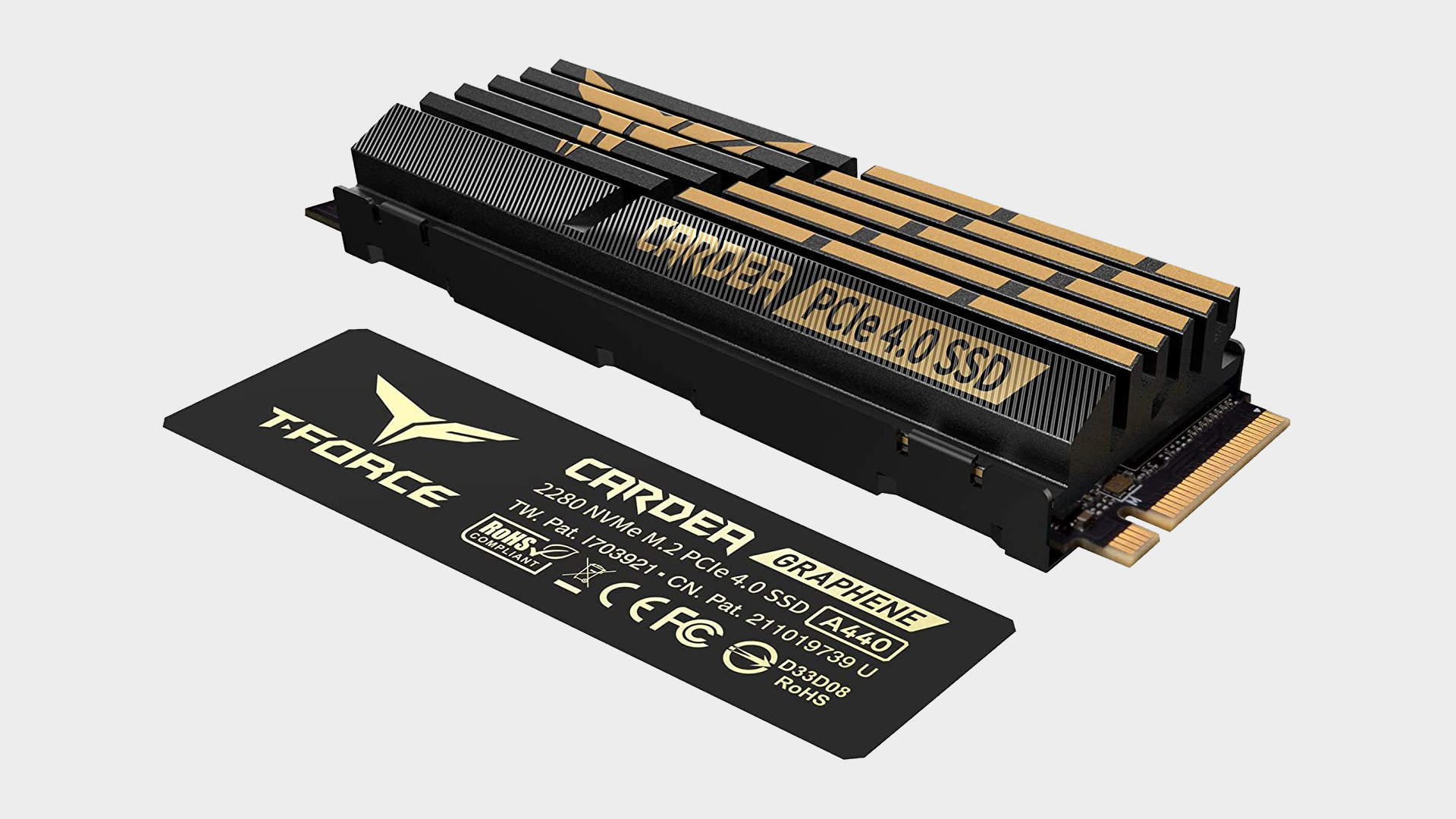
Capacity: 2TB
Interface: PCIe 4.0 x4
Controller: Phison E18
NAND: 96-layer TLC
Rated seq. read: 7,000 MB/s
Rated seq. write: 6,900 MB/s
Endurance: 1,400 TBW
Warranty: 5 years
Price: $423 (Amazon.com)
The Cardea A440 SSD makes use of Micron's 96-Layer TLC NAND. The 2TB drive also includes a 2GB DRAM buffer which gives it a performance edge over budget drives which have started to drop their DRAM caches.
As I mentioned before, the drive is built around the Phison PS5018-E18 memory controller. This 8-channel PCIe 4.0 controller is key to the performance of the Teamgroup SSD. It’s a new 12nm design which should help to address some of the unwelcome heat generating characteristics of high-performance M.2 drives. We’ll see if it's got what it takes to challenge the mighty Western Digital SN850 and Samsung 980 Pro.
The 2TB Cardea A440 features a very competitive 1,400 TBW endurance rating to go with a five-year warranty. That endurance rating is better than the WD SN850 and Samsung 980 Pro, both of which feature a 1,200 TBW rating for their 2TB models. Not that you’d expect home users to thrash drives to anywhere near that extent.
Do those awesome specs translate to real world performance? The Cardea A440's sequential performance gets close to the limits of what’s possible from a PCIe 4.0 x4 link with 7GB/s and 6.7GB/s read and write speeds.
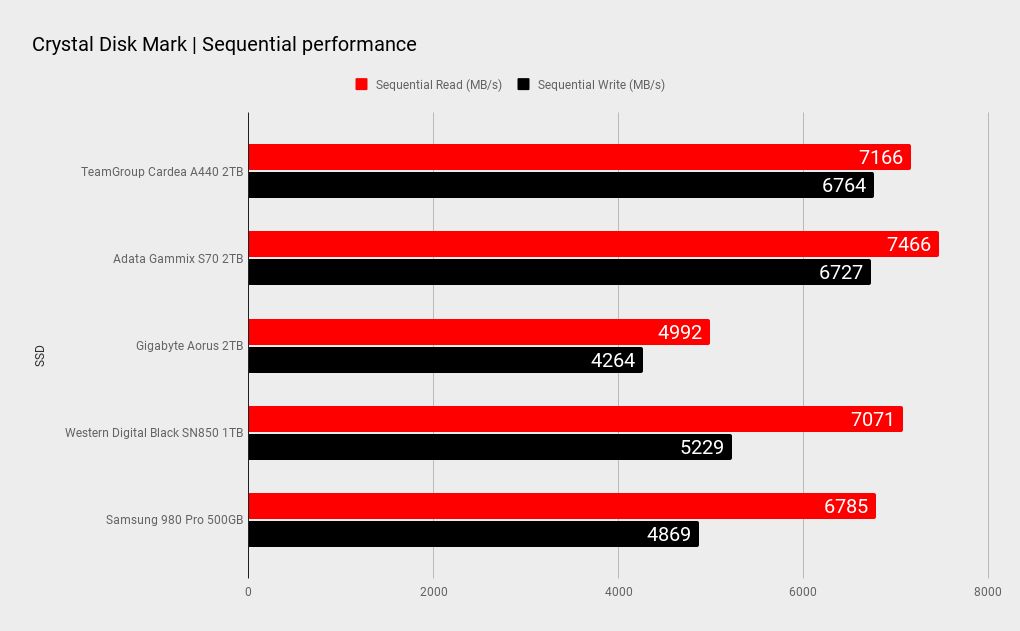
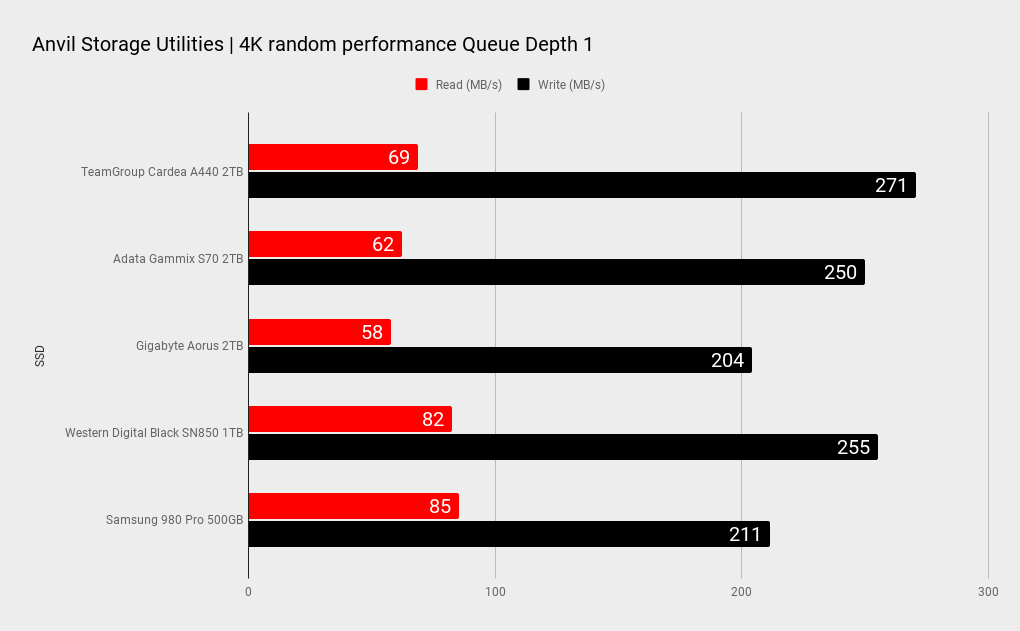
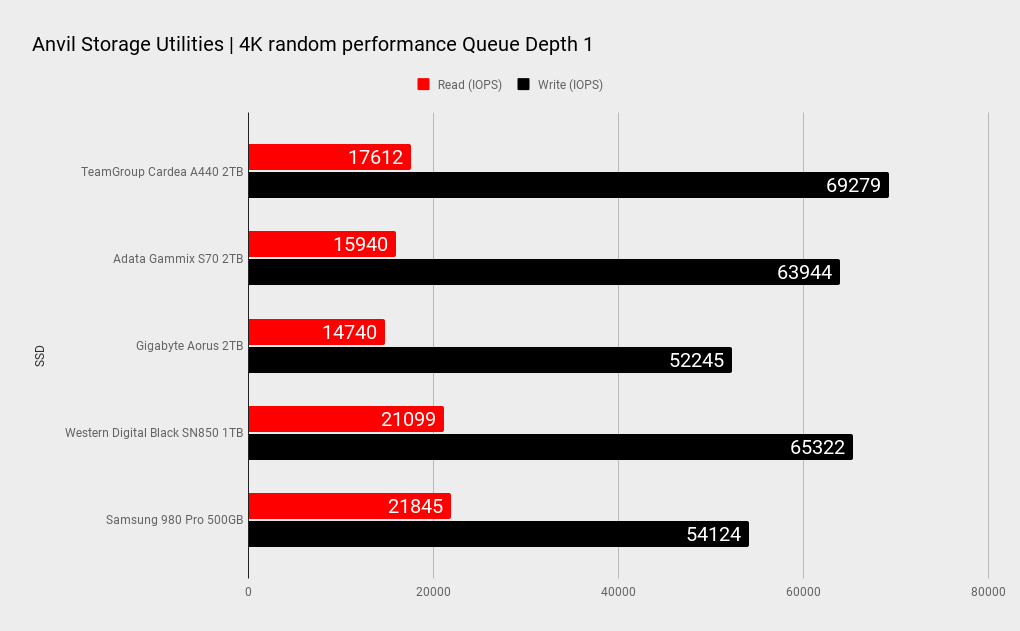
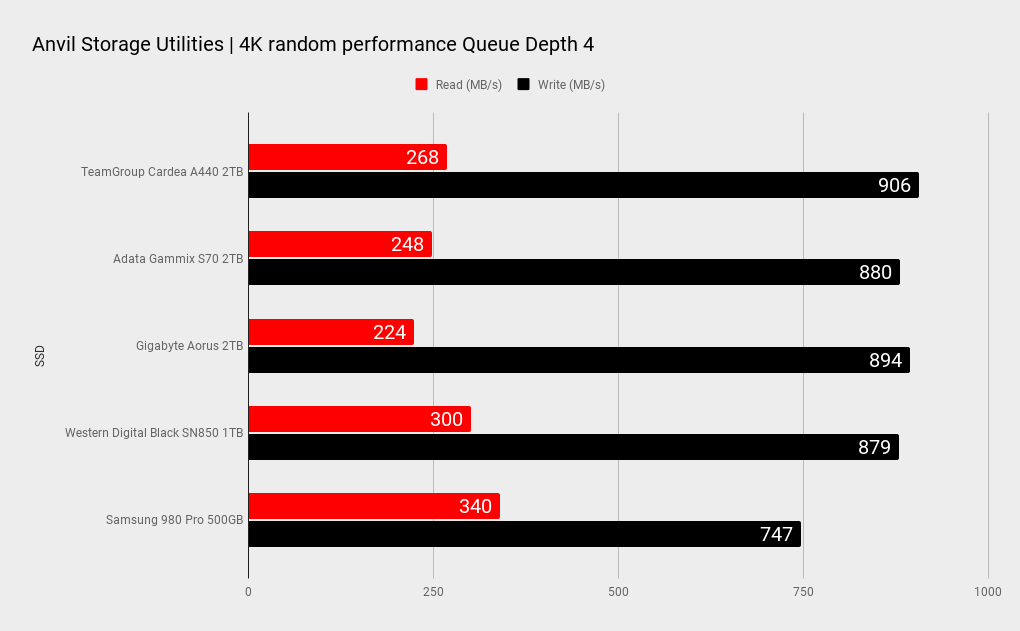
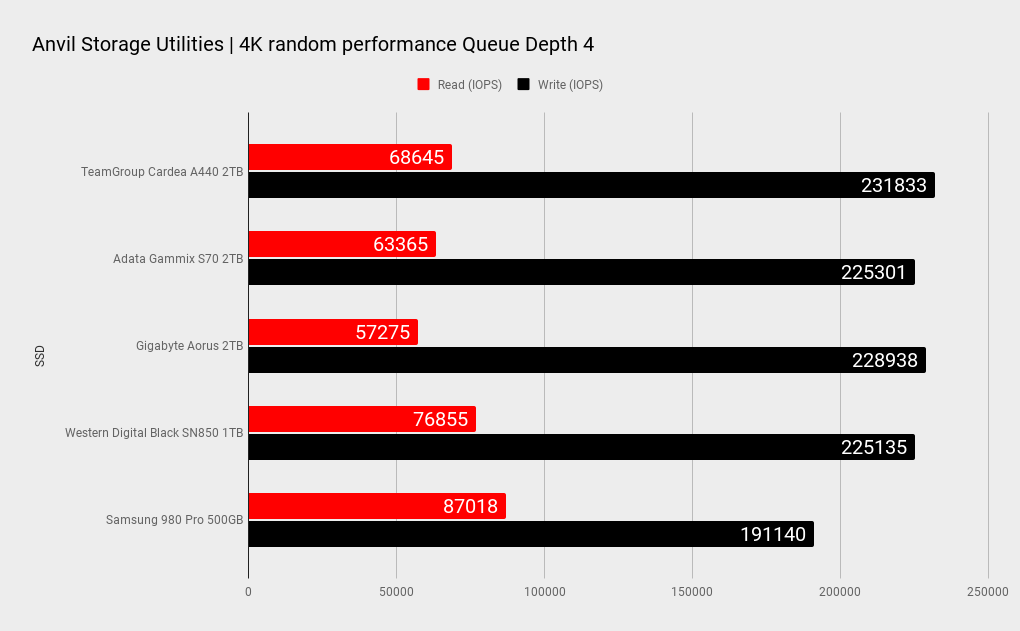
Digging a little deeper, the A440 delivers very good 4K write performance and its low queue depth write IOPS results are also strong. It can't match the top performing SN850 or 980 Pro at low queue depth read performance though, and this is arguably the most important characteristic that separates a fast SSD from a very fast one. That's where Intel's old Optane drives won many fans.
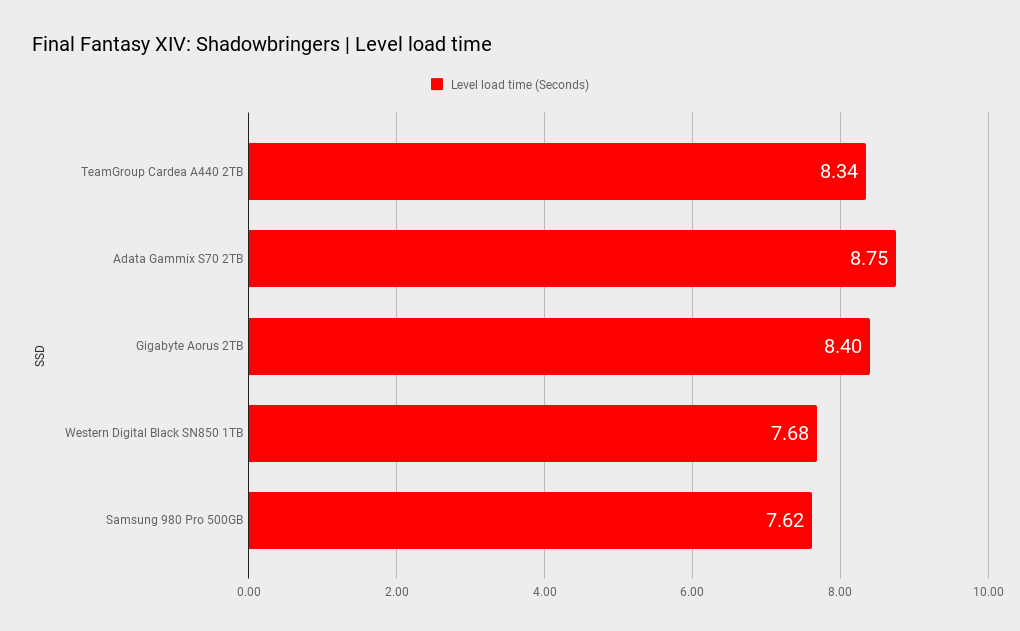
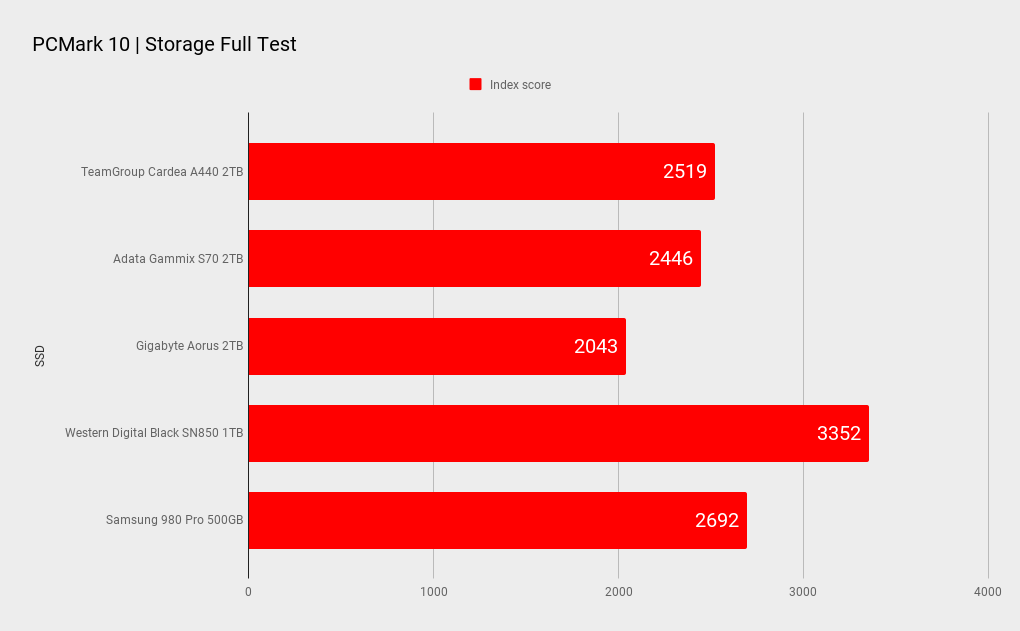
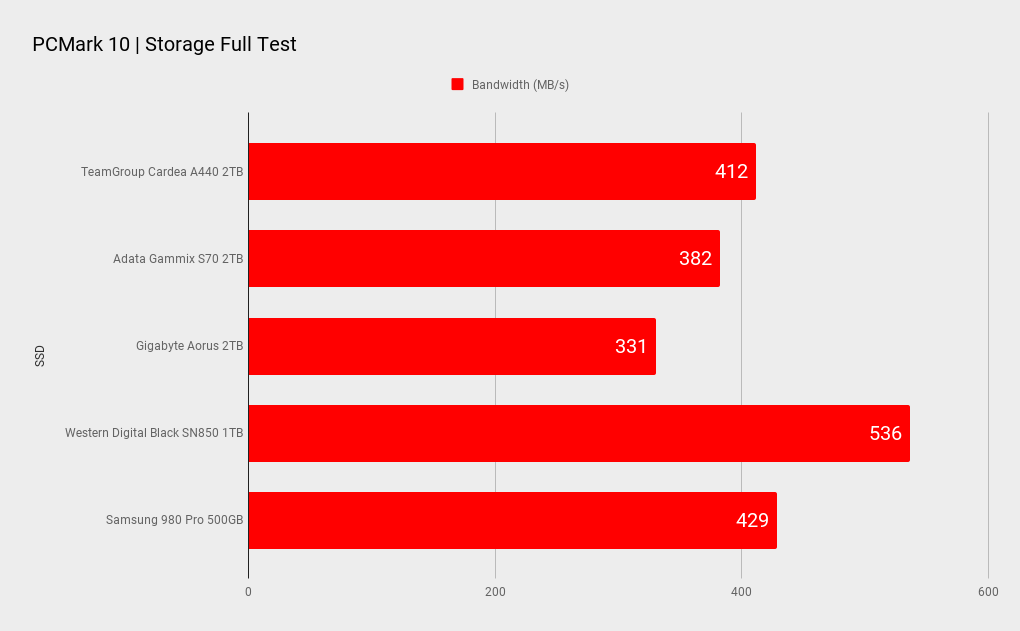
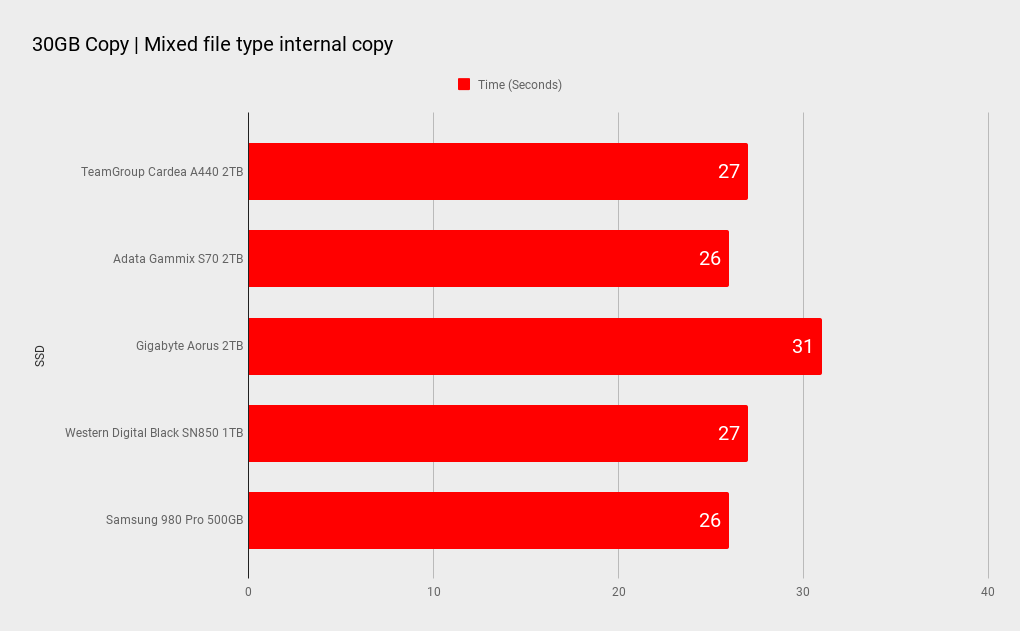
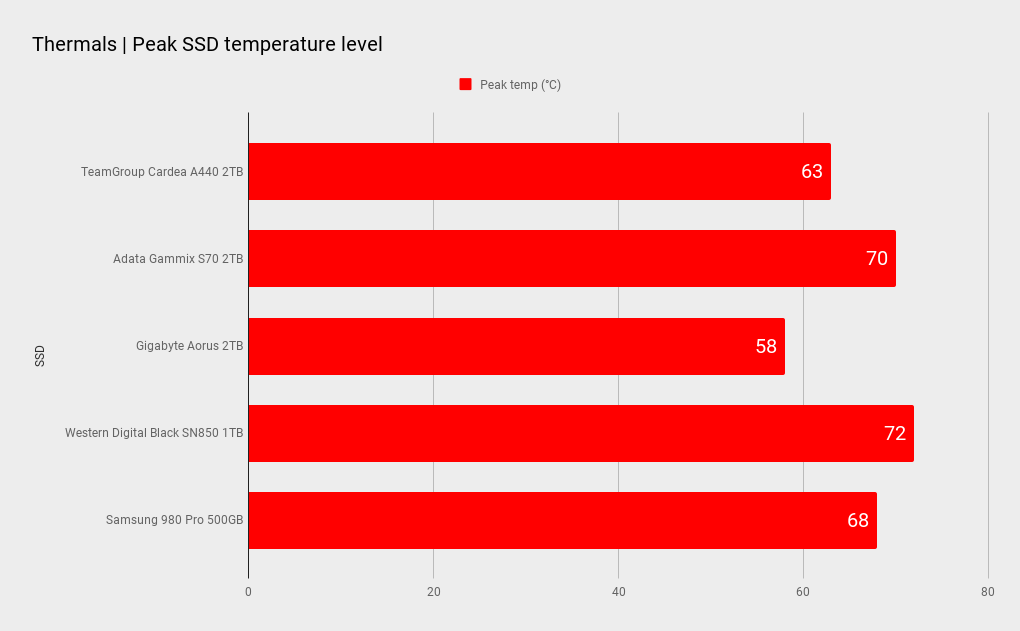
CPU: AMD Ryzen 9 5800X
Motherboard: Asus Crosshair VIII Dark Hero
RAM: 2x8GB TeamGroup Xtreem DDR4-3600
Graphics: Nvidia Geforce RTX 3080
Power Supply: Corsair AX1000
Cooling: NZXT Kraken X73 AIO
Operating system: Windows 10 Pro 64-bit
This is borne out by the Final Fantasy game loading times test and the PCMark10 storage tests, where the Phison based drive lags a little bit compared to the fully in-house designed WD and Samsung drives. But, it's not as if the A440 is bad. Far from it.
The A440's write performance is as good as any drive on the market. We might even see some firmware updates down the road that will improve the Cardea further.
Performance is important, but that won't matter if the drive heats up too much and throttles back on pace. Using the bundled large heatsink, we saw a peak temperature of 63°C under a heavy sustained write load. This is a real strength of the drive, as the heatsink-less designs of some other drives can run into throttling issues unless you cool them properly under a motherboard heatsink.
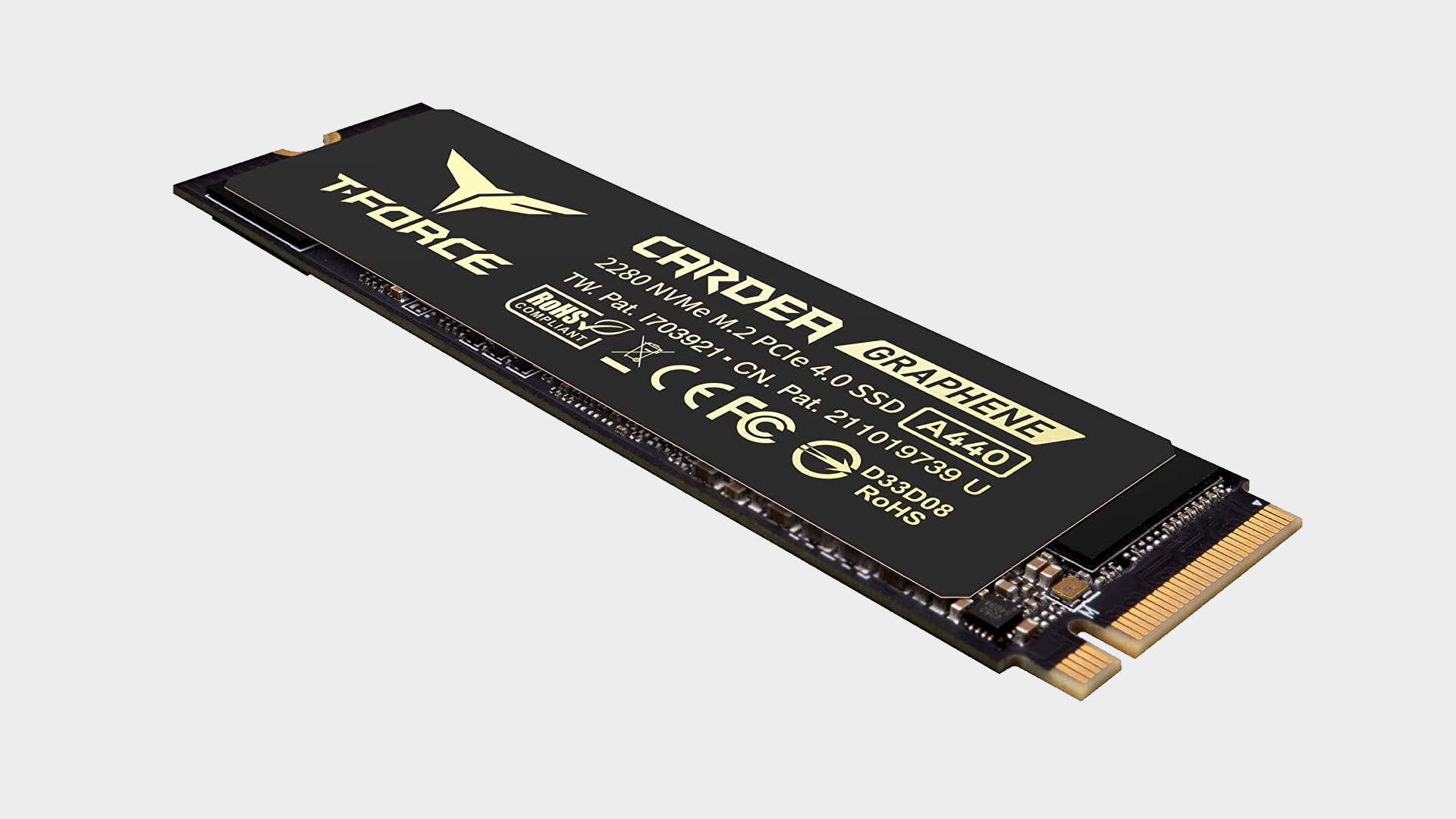
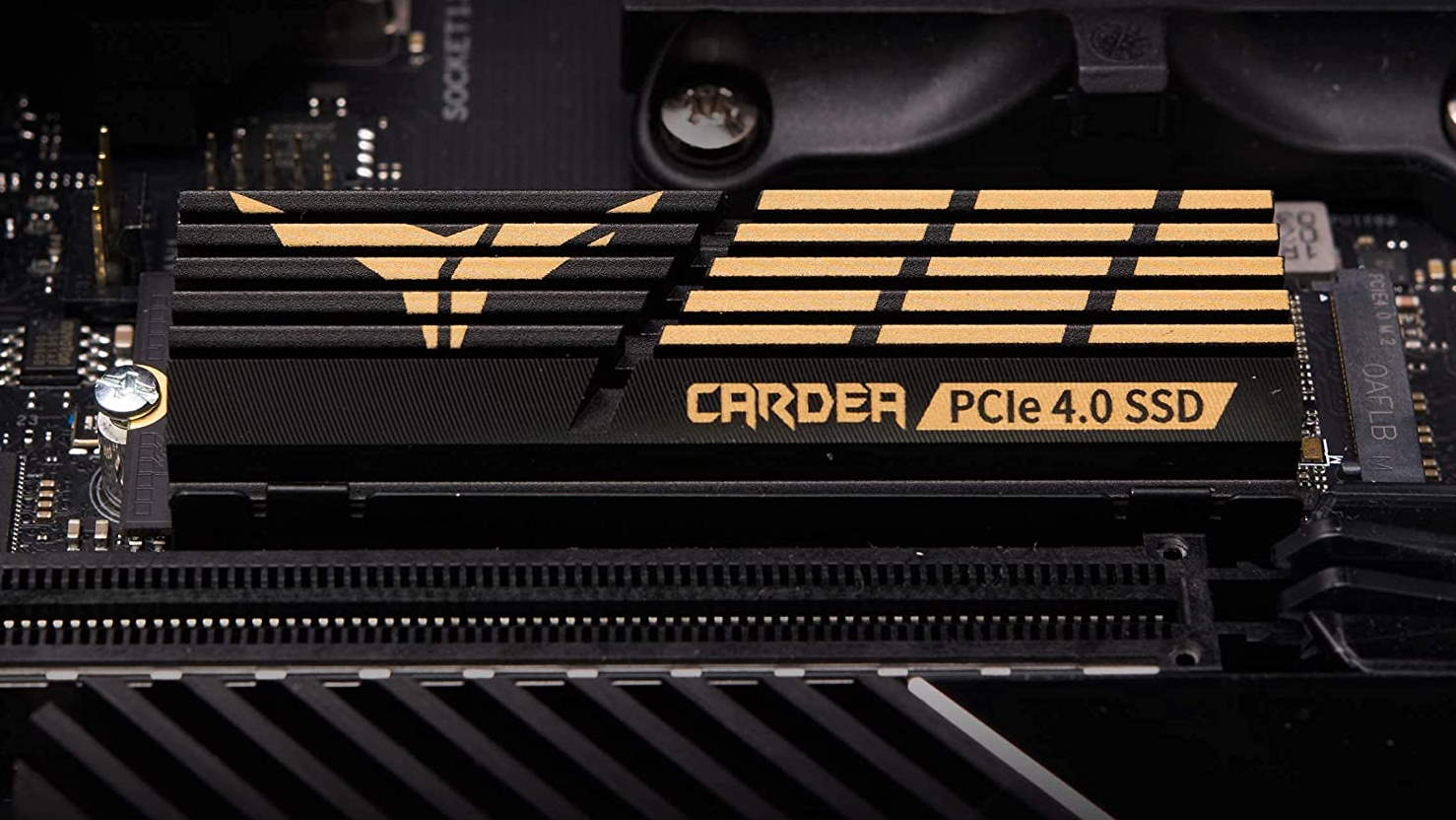
The Teamgroup Cardea A440 might not offer the most outstanding value on the market, but it does offer some outstanding performance.
Its write performance is as good as any drive on the market and it shines under sequential loads but it can’t match the likes of the WD SN850 or Samsung 980 Pro in read performance.
Do differences measured in microseconds really matter though? With hard drive access times measured in milliseconds it does, but we're at the stage where a fast NMVe drive offers so much in terms of sequential, random, and IOPS performance that it's becoming harder to differentiate between them.
That's where things like endurance ratings, price per gigabyte, and operating temperatures come into play. Looking at the A440, the endurance rating of 1,400 TBW is very good, and its operating temperature is also better than the similar Adata S70.
At the time of writing though, its price is a bit high for our liking. At $423 the Cardea A440 2TB faces tough competition from the cheaper Samsung 980 Pro at $397, as well as other Phison E18 drives from the likes of Corsair and Gigabyte. Those drives don't have the flexible cooling options of the Team A440 though, and that fact alone will appeal to many users.
As always, pricing is subject to change, and we’d expect the A440 to drop a bit once it becomes more widely available.
If you seek maximum write performance or you’re impressed by the choice of cooling options, then the Teamgroup A440 will really serve you well. A gamer is more likely to be won over by class leading read performance, but when everything is considered together, the strengths of the A440 add up to a solid recommendation from us.
You're not going to miss a pretty much irrelevant amount of read performance, and the Teamgroup Cardea A440 offers many storage strengths of its own. It's an easy recommendation... assuming the current high pricing settles down.

Chris' gaming experiences go back to the mid-nineties when he conned his parents into buying an 'educational PC' that was conveniently overpowered to play Doom and Tie Fighter. He developed a love of extreme overclocking that destroyed his savings despite the cheaper hardware on offer via his job at a PC store. To afford more LN2 he began moonlighting as a reviewer for VR-Zone before jumping the fence to work for MSI Australia. Since then, he's gone back to journalism, enthusiastically reviewing the latest and greatest components for PC & Tech Authority, PC Powerplay and currently Australian Personal Computer magazine and PC Gamer. Chris still puts far too many hours into Borderlands 3, always striving to become a more efficient killer.
